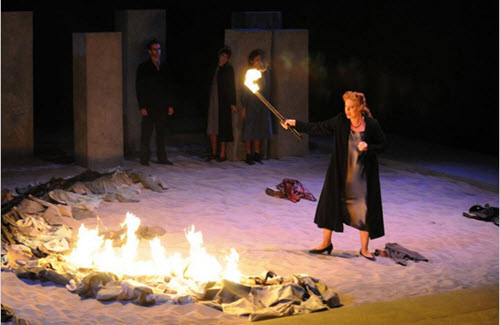 Spain Verdi: Nabucco, Orchestra and Chorus of the Liceu, Daniel Oren (conductor), Theatre del Liceu, Barcelona, 19 & 21.10.2015 (JMI)
Spain Verdi: Nabucco, Orchestra and Chorus of the Liceu, Daniel Oren (conductor), Theatre del Liceu, Barcelona, 19 & 21.10.2015 (JMI)

Casts:
Nabucco: Ambrogio Maestri/Luca Salsi
Abigail: Martina Serafin/Tatiana Melnychenko
Zaccaria: Vitalij Kowaljow/Enrico Iori
Ismaele: Roberto De Biasio/Alejandro Roy
Fenena: Marianna Pizzolato
Priest: Alessandro Guerzoni
Abdallo: Javier Palacios
Anna: Anna Puche
Production: Liceu in co-production with La Scala, Covent Garden and Chicago Lyric Opera
Direction: Daniele Abbado
Sets and Costumes: Alison Chitty
Lighting: Alessandro Carletti
The Liceu season opened with this Verdi opera which seems to be a kind of box-office insurance in difficult times. I say this because not only has Nabucco been completely sold out every day in Barcelona, but also a number of houses have decided to offer it in October. I’ve never seen such a plethora of Nabuccos in so short a period of time. Without claiming the list is definitive, I can say it is being staged in Cagliari, Modena, Pittsburgh, Jesi, Berlin, St. Gallen and Oviedo, as well as Barcelona.
With regard to the Liceu’s Nabucco, it pleased the audiences, particularly the musical aspect, although the vocal casts were not especially brilliant, and the stage production held little interest.
Daniele Abbado offers a fairly minimalist staging: a sort of Jewish cemetery in the first act and then a shift to the desert (there is sand on stage). It’s quite confusing, and perhaps refers to the settlement of Jews in Palestine after World War II. What is Abbado trying to say in this production? Hard to tell, even after reading what he has to say in the program. The lighting is unremarkable, and there are some video projections at the back of the stage that are distracting and add nothing to the action. Abbado’s direction has never been his strong point, and that is true here. One rarely attends a performance where the chorus is so important yet its movement is so scarce.
Conductor Daniel Oren was the best part of the performance. A few days ago, I read an interview with Riccardo Muti where he said that the public should boo a conductor who moves too much on the podium. If the public were to follow Mr. Muti’s advice, the booing of Mr. Oren would be endless: he is an exceptional acrobat on a podium, giving spectacular jumps that one day could hurt him. But my interest lies more in musical results than in any physical excesses from the conductor, and the truth is that Oren provided a remarkable reading of Nabucco, drawing an excellent performance from an orchestra that seemed a different group under his baton. The chorus was a big success with the audience, and was forced to offer a bis of “Va Pensiero” both days.
Ambrogio Maestri as Nabucco in the first cast didn’t convince me. As I commented after he played the role in Valencia a few months ago: “It is not a question of voice or power, but rather of style, elegance and expressiveness.” The second Nabucco was Luca Salsi, who gave a strong performance. Although he is not exactly what is called a Verdi baritone, he is better suited to the role than Maestri.
Austrian soprano Martina Serafin in the part of Abigail left me with the same impression as when I saw her as Turandot in Bilbao. She’s an excellent singer who has offered her magnificent Marschallin in the main opera houses of the world, but in recent years she has decided to move into Italian opera. She is still a remarkable singer, but neither Turandot nor Abigail suit her vocal characteristics. Her low notes are inaudible, and her top is faded, tight and verges on shouting. Ukrainian soprano Tatiana Melnychenko was better-suited for Abigail than Ms. Serafin. Her voice is important in the middle, attractive and wide enough, and well-suited to the demands of the character. One can hear her lower notes, but she is rather too tight at the top. In fact, she escaped the top notes at times, as at the end of Act I, while at other moments she was almost in trouble, as in her great scene of the second act.
Ukrainian bass Vitalij Kowaljow offered a Zaccaría of great nobility, with an attractive voice accompanied by a convincing performance. As full happiness does not exist, I have to say that his volume is less than desirable, especially in a theatre the size of Liceu. The presence of Enrico Iori as Zaccaria in the second cast is a mystery beyond my understanding. Zaccaria is one of the most important roles for a bass that Verdi wrote, and many qualities are needed to sing it. Enrico Iori’s voice is best suited for comprimario roles. I can understand casting him as Priest, but never as Zaccaria.
Roberto De Biasio did well in the character of Ismaele. The same could be said of Alejandro Roy in the second cast. Marianna Pizzolato was an excellent Fenena, singing with gusto her aria in the last act.
In the secondary characters Alessandro Guerzoni was sonorous as the Priest, while Javier Palacios showed in Abdallo a smaller voice than I remembered from him. Anna Puche (Anna) impressed in the ensembles.
José M. Irurzun